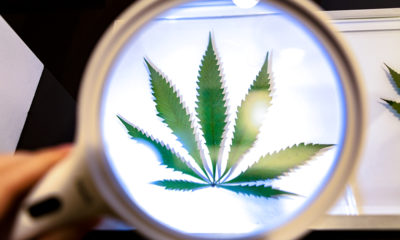
Medical
Canada Cuts Medical Marijuana Provided to Veterans
Daily limits on cannabis use imposed on veterans a year ago are having devastating results.
Canada, the worldwide leader in medical marijuana, has so far been a model for other countries to follow. Companies producing cannabis with licensing from Health Canada, the nationwide health ministry, provide marijuana to almost 270,000 patients and export both cannabis flower and oil to other countries.
Until 2015, a disproportionate amount of the domestic supply was going to a small group of military veterans in New Brunswick, a small province in eastern Canada along the American border.
There are more than 14,000 military veterans in Canada with PTSD. As a detailed investigation from the Globe and Mail revealed, a group of these vets near Base Gagetown, a New Brunswick military base, billed the national veterans’ affairs organization for almost 40 percent of all cannabis paid for by Veterans Affairs Canada.
Government spending on cannabis for military veterans soared from $63,000 in 2010 to $20.5 million in 2015, to $63 million through the end of 2016. The government tired of the arrangement and slapped daily limits on how much cannabis the veterans were allowed to consume on a daily basis — slashing the daily limit of government-funded weed by 70 percent.
Instead of up to 10 grams a day, vets were limited to 3 — for reasons that were, according to the paper, mostly financial, rather than medical.
The results? Less taxpayer-funded cannabis is going to the veterans — and, according to the newspaper, an accompanying uptick in PTSD-related symptoms, including suicide and homelessness as well as other, “lesser” conditions like insomnia and paranoia.
The episode also draws a stark distinction between other drugs used to treat PTSD —including prescription opiates as well as mood-altering antidepressants — and cannabis.
While medical research into marijuana’s efficacy to treat disorders like PTSD is still in the beginning stages, anecdotal evidence is nearly universal in its support for cannabis as a less harmful alternative to pharmaceutical drugs for the debilitating condition.
No accompanying limits or outrage appear to extend to the pharmaceutical regimen for PTSD, which Canadian doctors treat with “a cocktail of sleeping pills, antidepressants, anti-anxiety agents, antipsychotics, tranquilizers, benzodiazepines and so-called off-label medications designed to treat other conditions entirely,” as the Globe and Mail reported.
The following anecdote from Cory Pike, a father of four who served one tour of duty with the Canadian military in Afghanistan — where Canadian troops have been assisting the U.S.-led mission since the war on terror began — is all too typical.
From the Globe and Mail:
“None of the pills worked,” said Mr. Pike. “I had two handfuls of things I would take just so I could leave the house.” He began to abuse opiates, crack and cocaine, all to numb himself.
Then one day he tried smoking a joint. “I was able to function normally,” he says. “That’s how I felt. Normal.”
Another military veteran, Fabian Henry, says that after three years of drunk-driving arrests, threats to kill other people, and the implosion of his marriage and the loss of custody of his children — all a result of the loss of control and outbursts of rage that he says are a result of his PTSD — he finally bought some marijuana on the street.
Before long, he told the newspaper, he’d spent $37,000 on cannabis because the alternative was the situation described above.
Keep in mind that cannabis patients in Canada aren’t legally allowed to grow their own supply and that legal Canadian medical marijuana isn’t bought in a dispensary — it’s shipped directly to the patient by one of the Health Canada-licensed suppliers.
Thus, a veteran who wants cannabis has two choices: Do it the right way, and perhaps not have enough to treat his or her condition, or break the law.
Or, the third choice: go back to suicidal and homicidal tendencies. What would you choose?
TELL US, have you ever used cannabis for medical reasons?
























